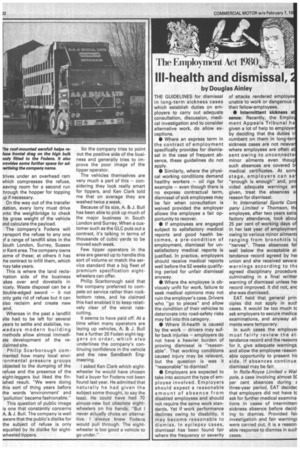The Employment Act 198O :
Page 34

If you've noticed an error in this article please click here to report it so we can fix it.
Ill-health and dismissa
by Douglas Ainley
THE GUIDELINES for dismissal in long-term sickness cases which establish duties on employers to carry out adequate consultation, discussion, medical investigation and to consider alternative work, do allow exceptions.
• Where an express term in the contract of employment specifically provides for dismissal in the case of frequent absence, these guidelines do not apply.
• Similarly, where the physical working conditions demand healthy workers — oil rigs for example — even though there is no express contractual term, dismissal of sick employees may be fair when consultation is waived provided the employer allows the employee a fair opportunity to recover.
• If employees are engaged subject to satisfactory medical reports and good health becomes, a pre-condition of employment, dismissal for unsatisfactory medical reports is justified. In practice, employers should receive medical reports well before the 52 weeks qualifying period for unfair dismissal anyway.
• Where the employee is obviously unfit for work, failure to seek medical opinions may not ruin the employer's case. Drivers who "go to pieces" and allow the condition of their vehicles to deteriorate into road-safety risks may fall into this category.
• Where ill-health is caused by the work — drivers may suffer back injuries — employers do not have a heavier burden of proving dismissal is "reasonable". That working conditions caused injury may be relevant, but the question is was it "reasonable" to dismiss?
• Employers are expected to take into account the type of employee involved. Employers should expect a reasonable amount of absence from disabled employees and should not require the same work standards. Yet if work performance declines owing to disability, it may become reasonable to dismiss. In epilepsy cases, dismissal has been found fair where the frequency or severity of attacks rendered employe unable to work or dangerous t their fellow-employees.
• Intermittent sickness a sence: Recently, the Emplo ment Appeals Tribunal ha given a lot of help to employe by deciding that the duties cumbent on them in long-ter sickness cases are not releva where employees are often a sent owing to unconnecte minor ailments even thoug such absences are covered b medical certificates. At som stage, employers can sa "enough is enough" and, pr vided adequate warnings a given, treat the absences a reason for dismissal.
In International Sports Co pany Limited v Thomson, th employee, after two years satis factory attendance, took abou 25 per cent of working days of in her last year of employmen owing to various minor ailment ranging from bronchitis t "nerves". These absences fel well below the acceptable attendance record agreed by hei union and she received severe warnings according to thE agreed disciplinary procedure culminating in a final writter warning of dismissal unless hei record improved. It did not, anc she was dismissed.
EAT held that general principles did not apply in suck cases. It would be too much tc ask employers to secure medica examinations, and anyway ailments were temporary.
In such cases the employei must fairly review the attendance record and the reasons for it, give adequate warnings and allow the employee reasonable opportunity to present hi: side. If absences continue dismissal may be fair.
In Rolls-Hoyce Limited v Wal pole, a case involving almost 5( per cent absences during E three-year period, EAT decidec that employers did not have tc ask for further medical examinations in cases of intermitteni sickness absence before decid. ing to dismiss. Provided fail investigation and fair warningE were carried out, it is a reason able response to dismiss in sucF cases.












































































































